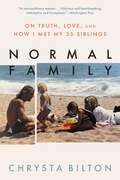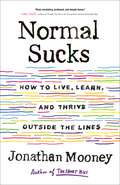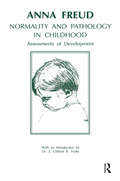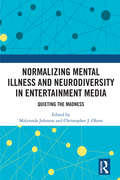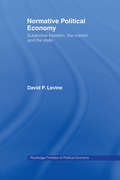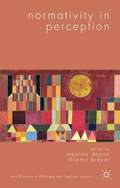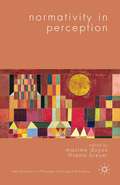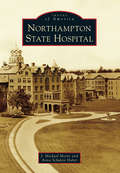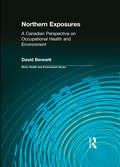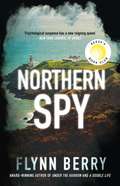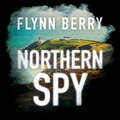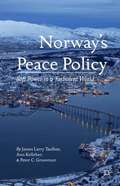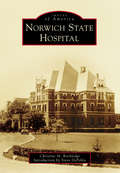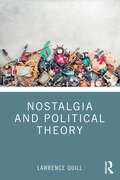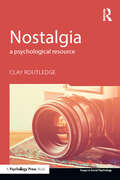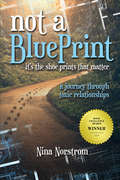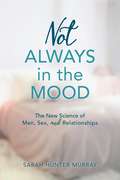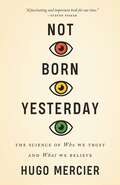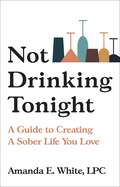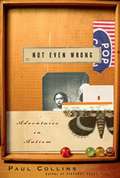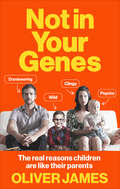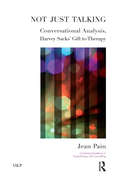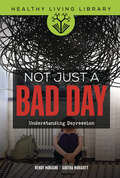- Table View
- List View
Normal Family: On Truth, Love, and How I Met My 35 Siblings
by Chrysta BiltonThis riveting, nuanced memoir about unforgettable individuals thrown together by chance and DNA tells a story of nature, nurture, and coming to terms with one's true inheritance. What is a &“normal family,&” and how do you go about making one? Chrysta Bilton&’s magnetic, larger-than-life mother, Debra, yearned to have a child, but as a single gay woman in 1980s California, she had few options. Until one day, while getting her hair done in a Beverly Hills salon, she met a man and instantly knew he was the one she&’d been looking for. Beautiful, athletic, artistic, and from a well-to-do family, Jeffrey Harrison appeared to be Debra&’s ideal sperm donor. A verbal agreement, a couple of thousand in cash, and a few squirts of a turkey baster later, and Chrysta was conceived. Over the years, Jeffrey would make regular appearances at the family home, which grew to include Chrysta&’s baby sister. But how much did Debra really know about the man she&’d chosen to father her daughters? And as a single mother torn between ferocious independence and abject dependence—on other women, alcohol, drugs, and the adrenaline of get-rich-quick schemes—what secrets of her own was she keeping? It wasn&’t until Chrysta was a young adult that she discovered just how much her parents had hidden from their daughters—and each other—including a shocking revelation with far-reaching consequences not only for Debra, Chrysta, and her sister, but for dozens and possibly hundreds of unsuspecting families across the country. After a lifetime of longing for a &“normal family,&” can Chrysta face the reality of her own, in all its complexity? Bringing us into the fold of a deeply dysfunctional yet fiercely loving clan that is anything but &“normal,&” this emotional roller coaster of a memoir will make you cry, laugh, and rethink the meaning of family. Named a 'Best Book of the Summer' by LA Times, People, USA Today, Vanity Fair, The Hollywood Reporter, Amazon, Apple, Cup of Jo, Kirkus, Parade, & Today
Normal Sucks: How to Live, Learn, and Thrive Outside the Lines
by Jonathan MooneyConfessional and often hilarious, in Normal Sucks a neuro-diverse writer, advocate, and father meditates on his life, offering the radical message that we should stop trying to fix people and start empowering them to succeedJonathan Mooney blends anecdote, expertise, and memoir to present a new mode of thinking about how we live and learn—individually, uniquely, and with advantages and upshots to every type of brain and body. As a neuro-diverse kid diagnosed with dyslexia and ADHD who didn't learn to read until he was twelve, the realization that that he wasn’t the problem—the system and the concept of normal were—saved Mooney’s life and fundamentally changed his outlook. Here he explores the toll that being not normal takes on kids and adults when they’re trapped in environments that label them, shame them, and tell them, even in subtle ways, that they are the problem. But, he argues, if we can reorient the ways in which we think about diversity, abilities, and disabilities, we can start a revolution.A highly sought after public speaker, Mooney has been inspiring audiences with his story and his message for nearly two decades. Now he’s ready to share what he’s learned from parents, educators, researchers, and kids in a book that is as much a survival guide as it is a call to action. Whip-smart, insightful, and utterly inspiring—and movingly framed as a letter to his own young sons, as they work to find their ways in the world—this book will upend what we call normal and empower us all.
Normality and Pathology in Childhood: Assessments of Development (Writings Of Anna Freud #Vol. 6)
by Anna FreudThe author's book deals with a most neglected aspect of psychoanalysis - normality. Its chief concern is with the ordinary problems of upbringing which face all parents and the usual phenomena encountered by every clinician. Yet, though primarily practical and clinical in its approach, it also makes a major theoretical contribution to psychology. The author begins with an account of the development of analytic child psychology, its techniques and its sources in child and adult analysis and direct observation of the child. The author then describes the course of normal development, how it can be hindered or eased, what are the unavoidable stresses and strains and how variations of normality occur. The author outlines a scheme for assessing normality and for gauging and classifying pathological phenomena in terms of the obstruction of normal progress rather than the severity of symptoms. Stress is laid on the problem of predicting the outcome of infantile factors for adult pathology in the face of the child's continual development. Finally, child analysis is considered both as a therapeutic method and as a means for the advance of knowledge.
Normalizing Mental Illness and Neurodiversity in Entertainment Media: Quieting the Madness
by Malynnda JohnsonThis volume examines the shift toward positive and more accurate portrayals of mental illness in entertainment media, asking where these succeed and considering where more needs to be done. With studies that identify and analyze the characters, viewpoints, and experiences of mental illness across film and television, it considers the messages conveyed about mental illness and reflects on how the different texts reflect, reinforce, or challenge sociocultural notions regarding mental illness. Presenting chapters that explore a range of texts from film and television, covering a variety of mental health conditions, including autism, post-traumatic stress disorder (PTSD), depression, and more, this book will appeal to scholars of sociology, cultural and media studies, and mental health.
Normative Political Economy: Subjective Freedom, the Market and the State (Routledge Frontiers Of Political Economy Ser.)
by David P. LevineNormative Political Economy explores the criteria we use for judging economic institutions and economic policy. It argues that prevailing criteria lack sufficient depth in their understanding of subjective experience. David Levine's arguments cover topics which include: * basic needs, equality and justice * freedom, self-integration and creative living * the role of the state * capitalism and the good society
Normativity in Perception (New Directions In Philosophy And Cognitive Science)
by Thiemo Breyer Maxime DoyonNormativity in Perception.
Normativity in Perception (New Directions in Philosophy and Cognitive Science)
by Thiemo Breyer Maxime DoyonThe ways in which human action and rationality are guided by norms are well documented in philosophy and neighboring disciplines. But how do norms shape the way we experience the world perceptually? The present volume explores this question and investigates the specific normativity inherent to perception.
Northampton State Hospital
by J. Michael Moore Anna Schuleit HaberNorthampton State Hospital, established in 1856, was built with the optimistic spirit of humanitarian reform. For many years, it was run by Dr. Pliny Earle, a champion of treatment that combined individualized care with manual labor, religious worship, recreation, and amusement. This vision was overwhelmed as the hospital was called upon to care for ever-larger numbers of people with varying needs. By the mid-20th century, the hospital was an isolated small "city," with hundreds of employees caring for more than 2,000 patients in overcrowded and inadequate conditions. It became a nationally important center of political and legal struggle over the role of state hospitals in the care of the mentally ill. After being gradually phased out, the hospital was closed in 1993, and the buildings, though listed in the National Register of Historic Places, were demolished in 2006. This volume brings to life the 135-year story of Northampton State Hospital through beautiful and haunting photographs drawn from the collections of Historic Northampton, the city's local history museum.
Northern Exposures: A Canadian Perspective on Occupational Health and Environment (Work, Health and Environment Series)
by David Bennett Robert Forrant Charles Levenstein John Wooding'Northern Exposures' is an important and thought-provoking book that shows how the labor movement has embraced environmental protection and is beginning to create a new and more sustainable vision for the future. Dave Bennett's knowledge and commitment shine through. He is, by turns, the skeptical philosopher sifting the evidence and the passionate partisan arguing for the rights of the people. It makes for a rich and exhilarating mixture.-Nigel Crisp, Permanent Secretary, U.K. Department of Health, and Chief Executive, National Health Service (2000-2006), Author, Turning the World Upside Down: The Search for Global Health in the 21st Century (Royal Society of Medicine Press, 2010)
Northern Spy: A Reese Witherspoon's Book Club Pick
by Flynn BerryTHE INSTANT NEW YORK TIMES BESTSELLERA REESE'S BOOK CLUB PICK'You'll devour Northern Spy . . . I loved this thrill ride of a book'Reese Witherspoon'A sharp, moving thriller: you lose your breath for adrenalin'Abigail Dean, author of Girl A'An exciting thriller... A domestic noir with a difference'Adrian McKinty, author of The Chain'A chilling, gorgeously written tale'New York Times'Nerve-shredding suspense'Daily Mail'Thrillingly good... Flynn Berry shows a le Carré-like flair for making you wonder what's really going on at any given moment'Washington Post A producer at the Belfast bureau of the BBC, Tessa is at work one day when the news of another IRA raid comes on the air: as the anchor requests the public's help in locating those responsible for this latest attack - a robbery at a gas station - Tessa's sister Marian appears on the screen, pulling a black mask over her face.The police believe Marian has joined the IRA, but Tessa knows this is impossible. But when the truth of what has happened to her sister reveals itself, Tessa will be forced to choose: between her ideals and her family. Praise for Flynn Berry'Breathtaking . . . Berry writes thrillingly'New York Times'Beautifully paced and satisfyingly ominous'Guardian'Mesmerizingly effective'The Times 'A thrilling page-turner'Paula Hawkins, author of The Girl on the Train'Berry's clever, thrilling writing wound me in and left me heartbroken'Fiona Barton, author of The Widow'What a book! A skillful and compelling exploration of families, crime, and class'Clare Mackintosh, author of I Let You Go
Northern Spy: A Reese Witherspoon's Book Club Pick
by Flynn BerryTHE INSTANT NEW YORK TIMES BESTSELLER | A REESE'S BOOK CLUB PICK'You'll devour Northern Spy . . . I loved this thrill ride of a book'REESE WITHERSPOON'A chilling, gorgeously written tale... Berry is a beautiful writer with a sophisticated, nuanced understanding of this most complicated of places'NEW YORK TIMES'Thrillingly good... Flynn Berry shows a le Carré-like flair for making you wonder what's really going on at any given moment' WASHINGTON POST'An elegantly wrought story about the perils of not being what you seem... Nerve-shredding suspense'DAILY MAILA producer at the Belfast bureau of the BBC, Tessa is at work one day when the news of another IRA raid comes on the air. As the anchor requests the public's help in locating those responsible for this latest attack - a robbery at a gas station - Tessa's sister appears on the screen pulling a black mask over her face.The police believe Marian has joined the IRA, but Tessa knows this is impossible. But when the truth of what has happened to her sister reveals itself, Tessa will be forced to choose: between her ideals and her family.
Norway’s Peace Policy
by James Larry Taulbee Ann Kelleher Peter C. GrosvenorWith its multiple power centers and ongoing chronic issues, the post-Cold War world allows space for less powerful states to develop influential roles in responding to specific problems. Norway, for example, has focused its available capabilities and resources on the persistent issue of violent ethno-political conflict. This book explains why Norway chose its peace policy and demonstrates what a far-away country with a small population has been able to achieve as peacemaker and a peacebuilder. As a niche state, Norway has relied on political and economic rather than military strategies. It has also selected its locations for engagement based on assessments of the possibility that Norwegians will be able to assist local people to make progress toward peace. The book provides an analysis of Norway's identity, agency, and domestic policy-making structure, as well as of criticisms that have surfaced within Norway. It includes case studies of peacemaking attempts in Sudan and Sri Lanka and of a peacebuilding project in Macedonia.
Nostalgia and Political Theory
by Lawrence QuillIn Nostalgia and Political Theory, Lawrence Quill advocates the central importance of nostalgia as a theoretical response to the ‘historic’ past and a vertiginous present. He does so by offering detailed analyses of diverse theoretical approaches, from the ancient world to the modern day, in order to reassess the relation between nostalgia and politics. Quill proposes nostalgia as an organizing concept, silently (and not so silently) influencing theorists as they construct critiques of the present or visions of the political future. Nostalgia and Political Theory surveys key contributions to nostalgic and antinostalgic thinking from across the political spectrum. Assessing the influence of photography, radio, television, and personal computing on changing conceptions of the past, Quill also considers the relation between populism, nationalism, and nostalgia. By challenging those who would dismiss nostalgia as irrational or a symptom of cultural malaise, Quill concludes by advancing the case for a liberal theory of nostalgia. Nostalgia and Political Theory will be of interest to scholars and students in the fields of political theory, social theory, sociology, philosophy, political science, memory studies, and nostalgia studies.
Nostalgia: A Psychological Resource (Essays in Social Psychology)
by Clay RoutledgeNostalgia is a topic that most lay people are familiar with, but, until recently, few social scientists understood. Once viewed as a disease, nostalgia is now considered to be an important psychological resource. It involves revisiting personally cherished memories that involve close others. When people engage in nostalgia, they experience a boost in positive psychological states such as positive mood, feelings of social connectedness, self-esteem, self-continuity, and perceptions of meaning in life. Since nostalgia promotes these positive states, when people experience negative states (such as loneliness or meaninglessness), they use nostalgia to regulate distress. This book explains in detail what nostalgia is, how views of it have changed over time, and how it has been studied by social scientists. It explores issues like how common nostalgia is and whether people differ in their tendency to be nostalgic. It looks at the triggers and inspiration for nostalgia, and the emotional states that are associated with it. Finally, the psychological, social, and behavioral effects of engaging in nostalgia are discussed. This volume provides the most comprehensive overview to date of the social scientific research into the complex and intriguing phenomenon of nostalgia. It will be of interest to a range of students and researchers in psychology and beyond, and its accessible writing style and engaging anecdotes will also be appreciated by a wider, non-academic audience.
Nostalgie als Stimmungsaufheller: Eine Einführung in die psychologischen Auswirkungen des nostalgischen Erinnerns (essentials)
by Gernot Schiefer Laura GehrleinDieses essential gibt einen kompakten Überblick über Nostalgie und welche Wirkungen nostalgisches Erinnern auf die eigene Stimmung und weitere psychische Funktionen hat. Ausgehend von einem vorwissenschaftlichen Verständnis des Konstrukts wird gezeigt, wie sich Nostalgie verändert hat und was die wesentlichen Inhalte persönlicher nostalgischer Erinnerungen sind. Die Autor*innen zeigen, wie Nostalgie genutzt werden kann, um positive Auswirkungen auf die eigene Befindlichkeit zu erzielen. Es werden auch Grenzen von Nostalgie dargestellt und gezeigt, wann und für wen nostalgische „Zeitreisen“ nicht vorteilhaft sind. Zudem werden Auswirkungen der Nostalgie auf depressive Personen analysiert.
Not A Blueprint: A Journey Through Toxic Relationships
by Nina NorstromAllowing us to learn lessons, let go of toxicity, and gain insight, relationship can play a powerful role in our lives. They are formed with people, alcohol, animals, battlefields, diseases, drugs, environments, and even our emotions. Whether toxic or nontoxic, relationships are an integral component of daily living. Author Nina Norstrom lost her child to a disease, but that wasn't the only toxic relationship she endured. In this book, she explores the effects that her relationships with grief, pain, trauma, and forgiveness have had on her life. This tale exposes a mother's struggle to escape her world of toxicity, her journey out of the clutches of diseased relationships, and the shoe prints the experiences have left on her family's history. This story in its raw form projects a remarkable voice to the heroic fight, courage, and bravery gained when striking back to wipe out toxic relationships. Its message reveals that life brings many challenges and that each challenge provides lessons to be learned. This book is not intended to be a blueprint for dealing with diseased relationships. It's about the shoe prints: those symbols of life's journey that are left by our experiences. "Not a Blueprint: It's the Shoe Prints that Matter" is an insightful and inspiring personal story of one family's journey through toxic relationships.
Not About a Boy
by Myah Hollis"This debut is a gritty teen drama full of mature themes that unfurl in compassionate ways and will resonate with many readers...Heartbreaking and powerful." —Kirkus Reviews (starred review)"Lucid and luminous." —ALA BooklistEuphoria meets Girl in Pieces in this coming-of-age story of a girl trying to put a grief-stricken past behind her, only to be startled by the discovery of a long-lost sister who puts into question everything she thought she knew.Amélie Cœur has never known what it truly means to be happy.She thought she’d found happiness once, in a love that ended in tragedy and nearly sent her over the edge. Now, at seventeen, Mel is beginning to piece her life back together. Under the supervision of Laurelle Child Services, the exclusive foster care agency that raised her, Mel is sober and living with a new family among Manhattan’s elite. It’s her last chance at adoption before she ages out of the system, and she promised, this time, she’ll try.But a casual relationship with a boy is turning into something she never intended for it to be, causing small cracks in her carefully constructed walls. Then the sister she has no memory of contacts Mel, unearthing complicated feelings about the past and what could have been.As the anniversary of the worst day of her life approaches, Mel must weather the rising tides of grief and depression before she loses herself, and those close to her, all over again.
Not Always In The Mood: The New Science Of Men, Sex, And Relationships
by Sarah MurrayMen’s sexual desire has long been depicted as high, simple, and unwavering. But the new research around men’s desire tells us this is far from true; and that good sex and relationships are suffering from these long-held misconceptions. In Not Always in the Mood: The New Science on Men, Sex, and Relationships sex researcher and relationship therapist Sarah Hunter Murray presents a lively, timely, and critical exploration of the newest, most surprising science on men and sex, shattering myths about men’s sexuality and helping today’s couples connect more deeply and authentically than ever before. <p><p> One-by-one, Murray examines the most detrimental, deep-held beliefs we as a society promote around men and their desire, and dive into how they affect our intimate relationships daily – and what to do about it. Do men actually crave and enjoy sex more than women? Do men “do the wanting” and prefer the chase? Where do they stand on sexual rejection? What’s the deal with porn? Answering these questions and more, this is a book for modern women and men alike. Moving beyond typical “here’s what he likes” sexual tips, the book empowers readers and offers a completely new perspective on sexuality that will validate men’s experiences and help their partners to a greater understanding of the psychology and emotions surrounding them.
Not Born Yesterday: The Science of Who We Trust and What We Believe
by Hugo MercierWhy people are not as gullible as we thinkNot Born Yesterday explains how we decide who we can trust and what we should believe—and argues that we're pretty good at making these decisions. In this lively and provocative book, Hugo Mercier demonstrates how virtually all attempts at mass persuasion—whether by religious leaders, politicians, or advertisers—fail miserably. Drawing on recent findings from political science and other fields ranging from history to anthropology, Mercier shows that the narrative of widespread gullibility, in which a credulous public is easily misled by demagogues and charlatans, is simply wrong.Why is mass persuasion so difficult? Mercier uses the latest findings from experimental psychology to show how each of us is endowed with sophisticated cognitive mechanisms of open vigilance. Computing a variety of cues, these mechanisms enable us to be on guard against harmful beliefs, while being open enough to change our minds when presented with the right evidence. Even failures—when we accept false confessions, spread wild rumors, or fall for quack medicine—are better explained as bugs in otherwise well-functioning cognitive mechanisms than as symptoms of general gullibility.Not Born Yesterday shows how we filter the flow of information that surrounds us, argues that we do it well, and explains how we can do it better still.
Not Drinking Tonight: A Guide to Creating a Sober Life You Love
by Amanda E. WhiteIn this honest discussion of mental health, the founder of Therapy for Women explores our reasons for drinking alcohol—and the benefits of taking a break. When &“retired party girl&” and popular therapist Amanda White admitted she was an alcoholic, it wasn&’t because she&’d done something outrageous while under the influence, like land herself in jail or get married in Vegas. It was because she realized three things: 1. Alcohol was making her life worse. 2. Moderation wasn&’t helping. 3. She could not be a therapist if she continued to use alcohol to numb her life. Something needed to change—not just her relationship with alcohol, but her relationship with herself. Choosing not to drink can be daunting. It&’s everywhere in our culture, our socializing, and our destressing. And it can seem black or white: you drink, or you don&’t (and if you don&’t, people ask why). That&’s where Not Drinking Tonight comes in. Judgement-free and relatable, Amanda helps you unpack your relationship with alcohol by showing you how to: Find out why you drink. Whether it&’s a glass of wine after work or a weekly bar crawl, your drinking habits can be the result of everything from biology to trauma.Heal your relationship with alcohol. Understand how your relationships have been affecting your life, and learn how to set boundaries and create true self care.Build the sober life you love. Learn what comes next—how to maintain your social life, navigate sex and relationships, and love yourself. Not Drinking Tonight isn&’t a program to stop drinking. It&’s the first book to help you address the root issues that cause you to reach for a drink, and create a life you love—one that is not perfect, but is messy and real and one you are fully present for.
Not Even Wrong: A Father's Journey Into the Lost History of Autism
by Paul CollinsIn Not Even Wrong, Paul Collins melds a memoir of his son's autism with a journey into this realm of permanent outsiders. Examining forgotten geniuses and obscure medical archives, and beginning to see why he himself has spent a lifetime researching talented eccentrics, Collins shows how these stories are relevant and even necessary to shed light on autism.
Not In Your Genes: The real reasons children are like their parents
by Oliver JamesProfessor Robert Plomin, the world’s leading geneticist, said in 2014 of his search for genes that explain differences in our psychology: ‘I have been looking for these genes for fifteen years. I don’t have any’.Using a mixture of famous and ordinary people, Oliver James drills deep down into the childhood causes of our individuality, revealing why our upbringing, not our genes, plays such an important role in our wellbeing and success. The implications are huge: as adults we can change, we can clutch our fates from predetermined destiny, as parents we can radically alter the trajectory of our childrens’ lives, and as a society we could largely eradicate criminality and poverty.Not in Your Genes will not only change the way you think about yourself and the people around you, but give you the fuel to change your personality and your life for the better.
Not Just Talking: Conversational Analysis, Harvey Sacks' Gift to Therapy (United Kingdom Council For Psychotherapy Ser.)
by Jean PainGood relationships depend, above all, on our skills in conversation. Harvey Sacks' method, Conversational Analysis, was the springboard for The author's research into psychotherapy as a social activity that depends for its success on the quality of the therapeutic dialogue. The author wrote this book not only for therapists, but for all those who do not understand what psychotherapy is for and are curious to know how it works. The author offers us new tools for all kinds of conversation to work for, rather than against, us.
Not Just a Bad Day: Understanding Depression (Healthy Living Library)
by Wendy Moragne Tabitha MoriartyDepression affects approximately 280 million people around the world, and it’s only becoming more common. As of 2021, 1 in 5 American adolescents had experienced a major depressive episode in the year prior alone. Depression can occur in anyone, and a variety of factors, from genetics to specific experiences, play a role in its development. With depression becoming increasingly prevalent, it is important to understand the disorder and the causes and symptoms related to it. This helps people identify it and support others or themselves. Not Just a Bad Day highlights what depression is, how it occurs, what treatments are available, and related conditions that may accompany it. Discover more about this widespread disorder.
